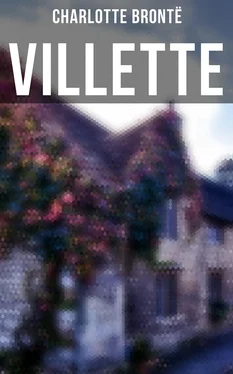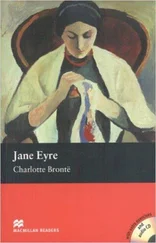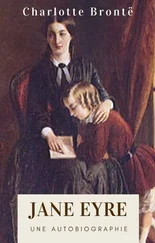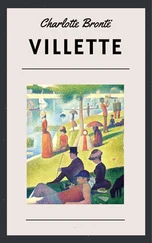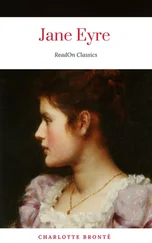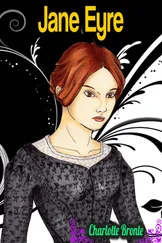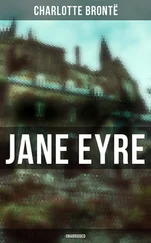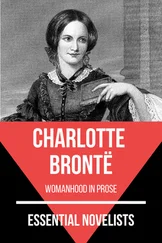The remembrance of his countenance, which I am sure wore a light not unbenignant to the friendless — the sound in my ear of his voice, which spoke a nature chivalric to the needy and feeble, as well as the youthful and fair — were a sort of cordial to me long after. He was a true young English gentleman.
On I went, hurrying fast through a magnificent street and square, with the grandest houses round, and amidst them the huge outline of more than one overbearing pile; which might be palace or church — I could not tell. Just as I passed a portico, two mustachioed men came suddenly from behind the pillars; they were smoking cigars: their dress implied pretensions to the rank of gentlemen, but, poor things! they were very plebeian in soul. They spoke with insolence, and, fast as I walked, they kept pace with me a long way. At last I met a sort of patrol, and my dreaded hunters were turned from the pursuit; but they had driven me beyond my reckoning: when I could collect my faculties, I no longer knew where I was; the staircase I must long since have passed. Puzzled, out of breath, all my pulses throbbing in inevitable agitation, I knew not where to turn. It was terrible to think of again encountering those bearded, sneering simpletons; yet the ground must be retraced, and the steps sought out.
I came at last to an old and worn flight, and, taking it for granted that this must be the one indicated, I descended them. The street into which they led was indeed narrow, but it contained no inn. On I wandered. In a very quiet and comparatively clean and well-paved street, I saw a light burning over the door of a rather large house, loftier by a story than those round it. This might be the inn at last. I hastened on: my knees now trembled under me: I was getting quite exhausted.
No inn was this. A brass-plate embellished the great porte-cochère:
“Pensionnat de Demoiselles” was the inscription; and beneath, a name,
“Madame Beck.”
I started. About a hundred thoughts volleyed through my mind in a moment. Yet I planned nothing, and considered nothing: I had not time. Providence said, “Stop here; this is your inn.” Fate took me in her strong hand; mastered my will; directed my actions: I rang the doorbell.
While I waited, I would not reflect. I fixedly looked at the street-stones, where the door-lamp shone, and counted them and noted their shapes, and the glitter of wet on their angles. I rang again. They opened at last. A bonne in a smart cap stood before me.
“May I see Madame Beck?” I inquired.
I believe if I had spoken French she would not have admitted me; but, as I spoke English, she concluded I was a foreign teacher come on business connected with the pensionnat, and, even at that late hour, she let me in, without a word of reluctance, or a moment of hesitation.
The next moment I sat in a cold, glittering salon, with porcelain stove, unlit, and gilded ornaments, and polished floor. A pendule on the mantelpiece struck nine o’clock.
A quarter of an hour passed. How fast beat every pulse in my frame! How I turned cold and hot by turns! I sat with my eyes fixed on the door — a great white folding-door, with gilt mouldings: I watched to see a leaf move and open. All had been quiet: not a mouse had stirred; the white doors were closed and motionless.
“You ayre Engliss?” said a voice at my elbow. I almost bounded, so unexpected was the sound; so certain had I been of solitude.
No ghost stood beside me, nor anything of spectral aspect; merely a motherly, dumpy little woman, in a large shawl, a wrapping-gown, and a clean, trim nightcap.
I said I was English, and immediately, without further prelude, we fell to a most remarkable conversation. Madame Beck (for Madame Beck it was — she had entered by a little door behind me, and, being shod with the shoes of silence, I had heard neither her entrance nor approach) — Madame Beck had exhausted her command of insular speech when she said, “You ayre Engliss,” and she now proceeded to work away volubly in her own tongue. I answered in mine. She partly understood me, but as I did not at all understand her — though we made together an awful clamour (anything like Madame’s gift of utterance I had not hitherto heard or imagined) — we achieved little progress. She rang, ere long, for aid; which arrived in the shape of a “maîtresse,” who had been partly educated in an Irish convent, and was esteemed a perfect adept in the English language. A bluff little personage this maîtresse was — Labassecourienne from top to toe: and how she did slaughter the speech of Albion! However, I told her a plain tale, which she translated. I told her how I had left my own country, intent on extending my knowledge, and gaining my bread; how I was ready to turn my hand to any useful thing, provided it was not wrong or degrading; how I would be a child’s-nurse, or a lady’s-maid, and would not refuse even housework adapted to my strength. Madame heard this; and, questioning her countenance, I almost thought the tale won her ear:
“Il n’y a que les Anglaises pour ces sortes d’entreprises,” said she: “sont-elles donc intrépides ces femmes là!”
She asked my name, my age; she sat and looked at me — not pityingly, not with interest: never a gleam of sympathy, or a shade of compassion, crossed her countenance during the interview. I felt she was not one to be led an inch by her feelings: grave and considerate, she gazed, consulting her judgment and studying my narrative. A bell rang.
“Voilà pour la prière du soir!” said she, and rose. Through her interpreter, she desired me to depart now, and come back on the morrow; but this did not suit me: I could not bear to return to the perils of darkness and the street. With energy, yet with a collected and controlled manner, I said, addressing herself personally, and not the maîtresse: “Be assured, madame, that by instantly securing my services, your interests will be served and not injured: you will find me one who will wish to give, in her labour, a full equivalent for her wages; and if you hire me, it will be better that I should stay here this night: having no acquaintance in Villette, and not possessing the language of the country, how can I secure a lodging?”
“It is true,” said she; “but at least you can give a reference?”
“None.”
She inquired after my luggage: I told her when it would arrive. She mused. At that moment a man’s step was heard in the vestibule, hastily proceeding to the outer door. (I shall go on with this part of my tale as if I had understood all that passed; for though it was then scarce intelligible to me, I heard it translated afterwards).
“Who goes out now?” demanded Madame Beck, listening to the tread.
“M. Paul,” replied the teacher. “He came this evening to give a reading to the first class.”
“The very man I should at this moment most wish to see. Call him.”
The teacher ran to the salon door. M. Paul was summoned. He entered: a small, dark and spare man, in spectacles.
“Mon cousin,” began Madame, “I want your opinion. We know your skill in physiognomy; use it now. Read that countenance.”
The little man fixed on me his spectacles: A resolute compression of the lips, and gathering of the brow, seemed to say that he meant to see through me, and that a veil would be no veil for him.
“I read it,” he pronounced.
“Et qu’en dites vous?”
“Mais — bien des choses,” was the oracular answer.
“Bad or good?”
“Of each kind, without doubt,” pursued the diviner.
“May one trust her word?”
“Are you negotiating a matter of importance?”
“She wishes me to engage her as bonne or gouvernante; tells a tale full of integrity, but gives no reference.”
“She is a stranger?”
Читать дальше
